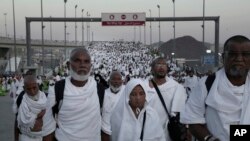U.S. President Barack Obama recognized the plight of the world's refugees Monday in a greeting to Muslims observing Eid-al-Adha — Islam's most important holy day.
"We are reminded of the millions of refugees around the globe who are spending this sacred holiday separated from their families, unsure of their future, but still hoping for a brighter tomorrow," the president said. The statement went on to say the United States remains committed to "welcoming the stranger with empathy and an open heart — from the refugee who flees war-torn lands to the immigrant who leaves home in search of a better life."
The president also said this observance was a celebration of the ways faith can transcend differences or boundaries and unite people under the banners of friendship and love.
Eid al-Adha is the Muslim feast of sacrifice. Muslims across the world mark the occasion by killing and sacrificing cows, sheep or goats in a display of religious devotion.
Stoning of the devil
The president's comments came as nearly 2 million Muslims performed the final rites of the Islamic Hajj — the symbolic stoning of the devil — in Saudi Arabia.
The rite takes place in the Saudi valley area of Mina, where pilgrims made their way toward the massive multi-story Jamarat Complex to cast pebbles at three large columns, where Muslims believe the devil tried to talk the Prophet Ibrahim out of submitting to God's will.
More than 2,000 people were crashed to death in a stampede last year in Mina.
The five-day Hajj is a series of rituals meant to cleanse the soul of sins and instill a sense of equality and brotherhood among Muslims.
The pilgrimage is one of the five pillars of Islam, and all able-bodied Muslims are expected to take part in the Hajj at least once in their lifetimes.
Most pilgrims will perform the stoning ritual for three days and sleep in tents at night.
In Mecca, Islam's most sacred site, pilgrims circle the cube-shaped Kaaba, which represents the metaphorical house of God and the oneness of God in Islam.
While following a route the Prophet Muhammad once walked, the rites are believed to ultimately trace the footsteps of the prophets Ibrahim and Ismail, or Abraham and Ishmael in the Bible.






